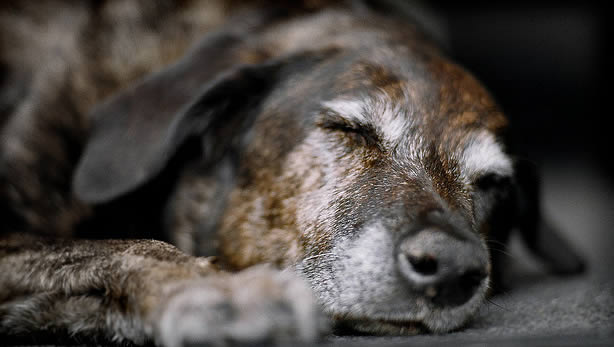The aging process is hard on everyone, including animals. You want to strive to treat your elderly dog with the respect and care that you would want to one day be given. By following the five guidelines listed below, you can help to provide your dog with the best quality of life possible throughout his or her golden years.
1. Supply Routine Veterinary Care
If your dog is over the age of six, bi-annual veterinary care is very important. Having your dog examined every at least every six months can play a key role in helping to detect diseases, infections and other health issues early and before the problem develops further. Early detection can play a major role in controlling and treating the ailment, often helping to prolong a better quality of life for the dog.
2. Offer Plenty of Physical Activity
Just like humans, dogs must stay physically active in order to thrive. Although your elderly dog may not move as fast as he or she used to, you should not allow him or her to become completely inactive. Spend some time each day interacting with your dog, playing catch with a ball, or going on a short walk. Regardless of the activity, remember that aging pets do tend to tire easier than their younger counterparts so make sure your dog is getting the needed exercise without becoming overly exhausted.
3. Maintain a Healthy Weight
Added weight can put a strain on your dog’s joints and internal organs making breathing and walking harder. Overweight dogs are also more prone to suffer from heart, lung, kidney, and liver problems, which sometimes drastically shorten the length of your pet’s life. Exercise and a proper diet both play an important role in keeping your dog at a healthy, happy weight.
4. Provide a Nutritious Diet
Feeding your dog a healthy diet during the senior years is vital in helping to ward off diseases, signs of aging, and of course, weight problems. Your veterinarian can help you to decide on a senior formula dog food that is just right for your pet.
5. Keep Your Dog’s Teeth Healthy
Routine dental care is another essential part of keeping your senior dog healthy. If tartar is allowed to build up on the teeth, it can cause the gum disease, gingivitis. Gingivitis left untreated, can lead to bacteria entering the dog’s bloodstream which can wreak major havoc on its internal organs. To help avoid this, brush your pet’s teeth daily and schedule a yearly professional dental cleaning with your veterinarian.
Lastly, you want to make sure that you provide your elderly dog with a comfortable, loving environment as he or she ages. Listed below are a few ways to do this:
- Offer your dog a quiet place to rest, away from the main areas and noises of the home
- If your dog has missing or loose teeth, consider purchasing wet food which is softer, instead of the dry variety
- Remind your children or grandchildren that the dog is older and requires gentler handling than before
- Remember that older bladders are harder to hold, allow your pet frequent bathroom breaks and be patient
- If you dog has cataracts or other vision problems, refrain from rearranging furniture, which can confuse them, limiting their mobility
- Be kind and patient; remember that you too, will one day be old
Dogs offer us so much love, companionship, and happiness that it should be an honor and a privilege has a pet owner to ensure that your dog’s senior years are as comfortable and enjoyable as possible. Remember to take good care of your elderly dog, he or she has been a good friend to you.
